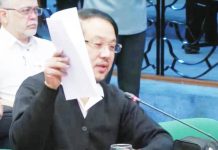![“May proprietary value ang [vaccine] nga gina-introduce nila sa aton. Kon gabakal ka bala sang isa ka butang daw as is, where is ang basis,” says Councilor Romel Duron of Iloilo City. “May proprietary value ang [vaccine] nga gina-introduce nila sa aton. Kon gabakal ka bala sang isa ka butang daw as is, where is ang basis,” says Councilor Romel Duron of Iloilo City.](https://www.panaynews.net/wp-content/uploads/2021/01/DURON_c-696x392.png)
ILOILO City — The Iloilo City Council was shaken on Thursday, September 25, when Councilor Romel Duron delivered a controversial privilege speech, with those present and heard him later asking if he appeared to have admitted to handing out money during the recent midterm elections.
His speech, made in the context of a broader discussion on corruption in government, quickly drew strong denials from fellow councilors who insisted they never engaged in vote-buying.
Duron, during the regular session of the Sangguniang Panlungsod, declared that no election candidate could have won without distributing money to voters.
“May nagadaog nga waay nagapanghatag kwarta? Abi sugiri nyo ko kay ma-resign ko dayon. Sin-o sa aton di’ makasiling nga nag daog nga wala nanghatag? Ang damo kwarta amo ang nagadaog. That I can tell you,” Duron said before fellow city councilors.
He added: “Abi sin-o sa inyo nagasiling. Hutiki nyo lang ko nga kamo ya wala gid nagahatag. Kay I am sure tanan kita guilty.”
But Duron described himself as “lesser guilty” because, in his words, he acted with a “Robinhood” spirit.
The statement sparked immediate reaction. Councilor Sedfrey Cabaluna, the city’s top councilor in the 2025 elections, flatly denied ever resorting to vote-buying.
“Categorically, I would say wala gid ko ya kaagi pamakal boto. I’ve not used vote-buying as means to win the election and earn the trust of the people,” Cabaluna said in an interview after the session.
He argued that Duron’s sweeping statement unfairly lumped all elected officials together and insulted the institution of the council.
“The council should do everything to preserve its integrity. Indi lang na kami ang naghuman sang ngalan sang konseho kundi ang nagligad man nga mga council. So to say nga makapungko ka lang da kag nakamakal kang boto is really an affront. Dapat magpanilay-nilay kag maghalong gid sa aton ginapanghambal,” Cabaluna stressed.
When asked why he did not rise to counter Duron’s remarks directly during the session, Cabaluna said he chose not to confront his colleague at that moment.
“I wanted to. I was thinking to stand and answer ang iya ginpanghambal pero I decided not to. Indi man kita gahakwat sang aton bangko permi, indi man kita ang madepensa sang aton reputasyon all the time. I think the people can answer that to us,” he explained.
Other councilors have also denied Duron’s insinuations, with some quietly expressing concern that his statement could damage public confidence in the city council.
While none have yet moved for formal sanctions, the incident has stirred debate about accountability, the role of money in politics, and the need to safeguard electoral integrity.
Vote-buying under Philippine election law
The Commission on Elections (Comelec) has repeatedly warned that vote buying and vote selling are strictly prohibited under the Omnibus Election Code (Batas Pambansa Blg. 881).
Section 261(a) of the Code classifies vote buying as an election offense, making it unlawful for “any person who gives, offers or promises money or anything of value, in order to induce anyone to vote for or against any candidate.”
Likewise, it also penalizes vote selling, or the act of accepting such money or benefit in exchange for votes.
Conviction for vote-buying carries severe penalties, including imprisonment of one to six years, disqualification from holding public office, and the loss of the right to vote.
Comelec officials have stressed that the prohibition is designed to preserve the sanctity of the ballot and ensure that elections reflect the true will of the people.
Duron’s remarks come at a time when the city government is grappling with broader discussions about corruption, transparency, and good governance.
The controversy has highlighted once again the long-standing issue of vote-buying in Philippine elections, often acknowledged privately but rarely admitted publicly by elected officials./PN





